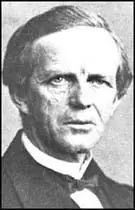Lyman Trumbull

Lyman Trumbull was born in Colchester, Connecticut on 12th October, 1813. After attending Bacon Academy he worked as a school teacher in Connecticut (1829-1833).
Trumbull studied law and after being admitted to the bar worked as a lawyer in Belleville, Illinois. A member of the Democratic Party, Trumbull served in the state legislature (1840-41), secretary of State of Illinois (1841-43) and a justice of the supreme court of Illinois (1848-53).
An opponent of slavery Trumbull joined the Republican Party before being elected to Congress in 1854. During the presidency of Andrew Johnson Trumbull was associated with the Radical Republicans.
After the outbreak of the American Civil War Trumbull introduced a Confiscation Act that was passed by Congress that enabled the Union Army to free slaves in Confederate territory. However, the law provided no enforcement mechanism and was ineffective.
In July, 1861, Trumbull was a member of a group of politicians, including Benjamin Wade, James Grimes, and Zachariah Chandler, who witnessed the Battle of Bull Run. The battle was a disaster for the Union forces and at one stage Trumbull came close to being captured by the Confederate Army. After arriving back in Washington, Trumbull was one of those who led the attack on the incompetence of the leadership of the Union Army.
Trumbull was a leading supporter of the Civil Rights Bill that was designed to protect freed slaves from Southern Black Codes (laws that placed severe restrictions on freed slaves such as prohibiting their right to vote, forbidding them to sit on juries, limiting their right to testify against white men, carrying weapons in public places and working in certain occupations).
When Andrew Johnson vetoed the Civil Rights Bill in March, 1866, Trumbull made an impassioned speech against the president. However, he doubted the legality of trying to impeach Johnson and voted against the measure.
In 1872 Trumbull supported the more radical Horace Greeley against the official Republican Party candidate, Ulysses S. Grant. After leaving the Senate in March, 1873 Trumbull returned to work as a lawyer in Chicago. He remained active in politics and in 1880 was unsuccessful bid for the post of Governor of Illinois. Lyman Trumbull died in Chicago on 25th June, 1896.
Primary Sources
(1) Lyman Trumbull, letter to Zachariah Chandler (9th November, 1862)
Hundreds of Republicans who believed that their sons and relatives were being sacrificed to the incompetency, indisposition or treason of pro-slavery Democratic generals, were unwilling to sustain the administration which allowed this. I felt myself that it was an uphill business to attempt to sustain the administration.
(2) On 27th March, 1866, Andrew Johnson vetoed the Civil Rights Bill that had been passed by Congress.
The bill in effect proposes a discrimination against large numbers of intelligent, worthy, and patriotic foreigners, and in favor of the Negro, to whom, after long years of bondage, the avenues to freedom and intelligence have just now been suddenly opened. He must, of necessity, from his previous unfortunate condition of servitude, be less informed as to the nature and character of our institutions than he who, coming from abroad, has to some extent at least, familiarized himself with the principles of a government to which he voluntarily entrusts "life, liberty, and the pursuit of happiness."
(3) Lyman Trumbull of Illinois led the attack on Andrew Johnson after he vetoed the Civil Rights Bill in March, 1866.
The bill neither confers nor abridges the rights of anyone but simply declares that in civil rights there shall be equality among all classes of citizens and that all alike shall be subject to the same punishment. Each state, so that it does not abridge the great fundamental rights belonging, under the Constitution, to all citizens, may grant or withhold such civil rights as it pleases; all that is required is that, in this respect, its laws shall be impartial. And yet this is the bill now returned with the President's objections.
Whatever may have been the opinion of the President at one time as to "good faith requiring the security of the freemen in their liberty and their property," it is now manifest from the character of his objections to this bill that he will approve no measures that will accomplish the object.
